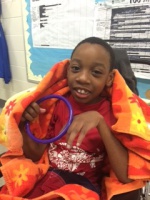Services We Provide
Occupational Therapy (Clinic & Aquatic-based) treatment focuses on helping persons with a physical, sensory, or cognitive disability be as independent as possible in all areas of their lives. OT can help a person with various needs improve their cognitive, physical, sensory, and motor skills and enhance their self-esteem and sense of accomplishment. Some people may think that occupational therapy is only for adults; kids, after all, do not have occupations. But a child’s main job is playing and learning, and occupational therapists can evaluate kids’ skills for playing, school performance, and daily activities and compare them with what is developmentally appropriate for that age group. According to the American Occupational Therapy Association (AOTA), in addition to dealing with an someone’s physical well-being, OT practitioners address psychological, social, and environmental factors that can affect functioning in different ways. This approach makes OT a vital part of health care for some kids.
Physical Therapy (Clinic & Aquatic-based) Doctors often recommend Physical Therapy (PT) for kids, teens & young adults who have been injured or who have movement problems from an illness, disease, or disability. After an injury, Physical Therapists work to decrease pain and help patients return to daily activities. They teach exercises designed to help their patients regain strength and range of motion, and also show kids and families how to prevent future injuries. Physical Therapy might be needed any time a problem with movement limits someone’s daily activities.
Adaptive Swim Lessons (1:1 & Small-Group) – In-Person ONLY
Summer Swim Camp – Safety & Basics – In-Person ONLY
Adaptive Art Lessons (1:1 & Small-Group) – Virtual ONLY
Mental Health Counseling – LCSW (Art-Based) – Virtual ONLY
Group Social Skills Classes – Virtual ONLY
Who Can Benefit from Our Services
We offer services for children, teens & young adults ages birth to 21
Diagnoses include, but are not limited to:
- ADD & ADHD
- Autism Spectrum Disorders
- Birth Injuries or Birth Defects
- Sensory Processing Disorders
- Traumatic Injuries (Brain or Spinal Cord)
- Learning Difficulties
- Juvenile Rheumatoid Arthritis
- Mental Health or Behavioral Problems
- Spina Bifida
- Cerebral Palsy
- Developmental Delays
- Post-Surgical Conditions
- Traumatic Amputations
- Multiple Sclerosis
- Angleman Syndrome

